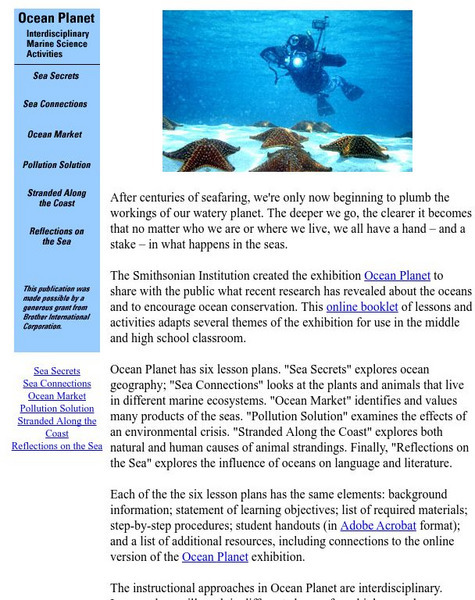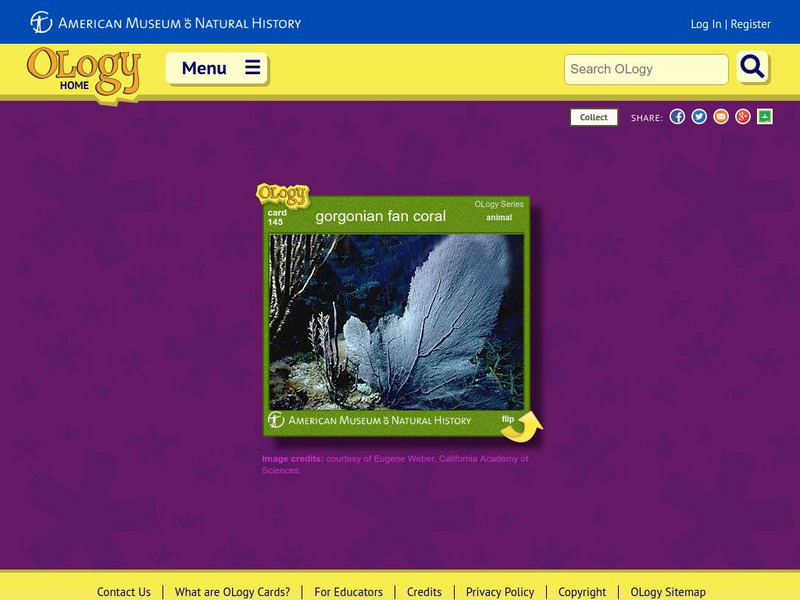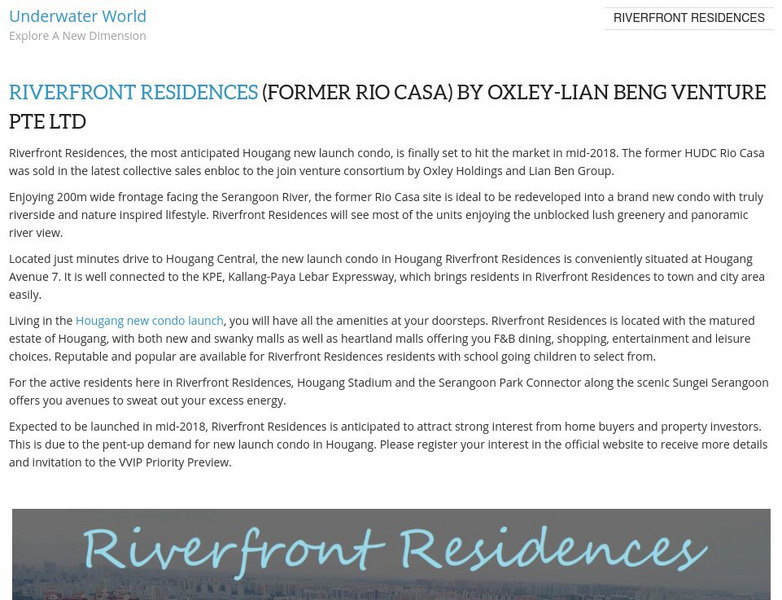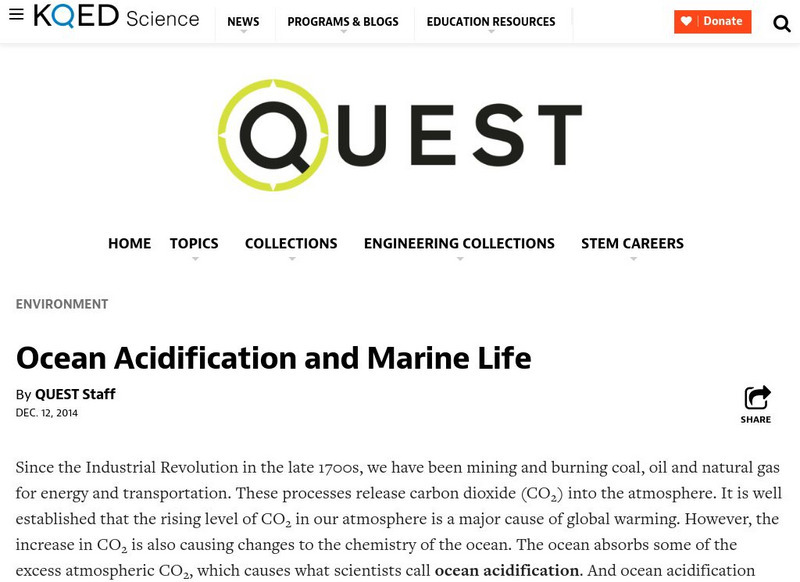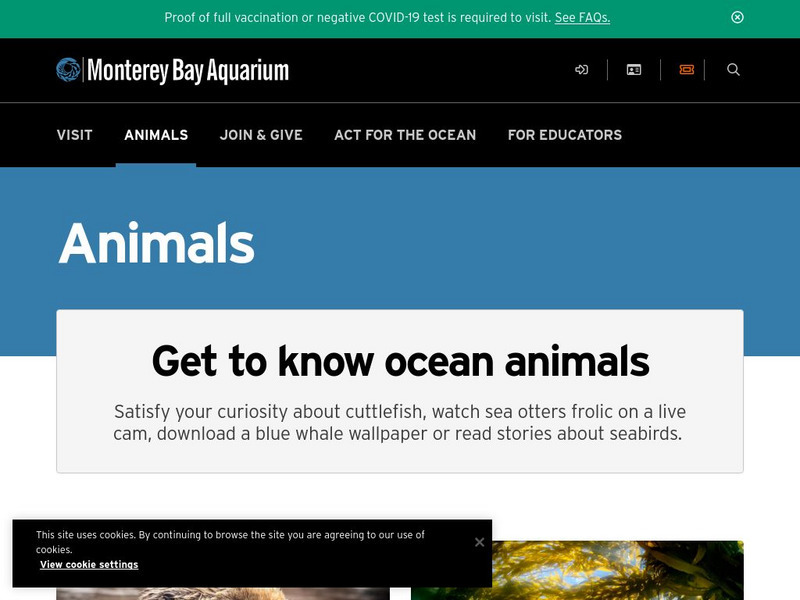The Franklin Institute
Treasures@sea: Exploring the Ocean Through Literature
This extensive resource consists of learning activities that integrate language arts with oceanography. Each activity is based on one of seven books about the ocean and are written to be adaptable. Includes writing activities, games and...
American Museum of Natural History
American Museum of Natural History: Milstein Hall of Ocean Life
Tour the museum's famed exhibition hall dedicated to ocean life at this online recreation. Find videos, maps, species specimens, and images that let you experience many of the museum's resources on ocean life right from your desktop.
TED Talks
Ted: Ted Ed: Deep Ocean Mysteries and Wonders
Marine biologist, David Gallo, shows why oceans are important while taking the viewer on a voyage into the ocean and exploring the incredible beauty of marine life. [8:24]
Smithsonian Institution
Smithsonian Education: Ocean Planet
A series of lesson plans designed to be used with the Smithsonian Ocean Planet exhibit (available online). Lesson topics include marine ecosystems, pollution of ocean water, animal strandings, and literature.
Society for Science and the Public
Science News for Students: Motion in the Ocean
This article reports on recent research that explains why corals are in nearly constant motion. Includes a brief video. [0:16]
Other
College of Exploration: Ocean Literacy [Pdf]
A guide to help educators become ocean literate. The goal is to redress the lack of ocean-related content in state and national science education standards, instructional materials, and assessments. PDF (requires Adobe Reader).
Kinder Art
Kinder Art: Construct an Artquarium (Lesson Plan)
This lesson plan gives students a chance to create their own underwater animal out of paper-mache, and their imagination. Provides a colorful photo example, assessment criteria, and a suggested book to use for inspiration.
Monterey Bay Aquarium
Monterey Bay Aquarium: Brain Coral
Resource presents extensive information about brain coral, including diet, size, range, relatives, conservation, and cool facts.
American Museum of Natural History
American Museum of Natural History: It Takes All Kinds to Make a World
Learn about the biodiversity found in the ocean by looking at examples of marine life.
American Museum of Natural History
American Museum of Natural History: Common Dolphin O Logy Card
Flip this interactive OLogy card and start learning bite-size pieces of useful information about the common dolphin, such as its habitat, diet, and physical characteristics.
American Museum of Natural History
American Museum of Natural History: Coral Reefs O Logy Card
By turning over this interactive OLogy card, you will find fast facts, questions and answers, and similar bite-size pieces of information designed to help you learn about coral reefs.
American Museum of Natural History
American Museum of Natural History: Giant Kelp O Logy Card
Flip this interactive OLogy card to find fast facts, questions and answers, and other bite-size pieces of information about the giant kelp.
American Museum of Natural History
American Museum of Natural History: Gorgonian Fan Coral O Logy Card
Uncover fascinating facts about the gorgonian fan coral by flipping over this interactive OLogy card.
Other
Underwater World, Singapore
At this site you will learn all about Underwater World in Singapore. You can get general information, take a virtual tour, see pictures, and download movies of a diver feeding fish.
Read Works
Read Works: Hook, Line, and Sinker
[Free Registration/Login Required] An informational text about the depletion of edible seafood populations. A question sheet is available to help students build skills in reading comprehension.
Read Works
Read Works: Under the Sea
[Free Registration/Login Required] An informational text about scientists who believe they have discovered several new species of marine life off the coast of Papua, New Guinea. A question sheet is available to help students build skills...
Other
Florida International University: Medina Aquarius Program
The official site for an underwater ocean laboratory located near the Florida Keys. Information about the lab and its work, as well as ocean and coral reef info for teachers and students. Includes photos, lesson plans, and links to other...
Woods Hole Oceanographic Institution
Woods Hole Oceanography Institute: Adaptations to Light
View several pictures of ocean life through the eyes of scientists and staff at Woods Hole Oceanography Institute. This particular slideshow highlights how ocean creatures change their colors in order to either hide from or frighten...
Other
Sea Anemones, Cnidaria
A resource with pictures that cover several types of anemones and their living environments.
PBS
Quest: How Ocean Acidification Affects Shelled Organisms
This step-by-step tutorial walks students through the effects of ocean acidification on some shelled marine organisms.
NOAA
Noaa: Arctic Marine Animals
This slide show contains pictures of invertebrate arctic animals filmed during a 2005 expedition. Each photograph has a short description of the animal. There are ten animals displayed.
Monterey Bay Aquarium
Monterey Bay Aquarium: Animal Guide
An extensive image-rich field guide to marine habitats and inhabitants, with detailed descriptions and "cool facts" about each.
Scholastic
Scholastic News: Sea Monster Found Alive!
The elusive giant squid was caught on video for the first time in 2013. This article describes the historic find.
American Museum of Natural History
American Museum of Natural History: Humpback Whale O Logy Card
OLogy cards are like virtual baseball cards about all kinds of science topics. This one is about the Humpback Whale and it contains information about the habitat, diet, and other ecological information. See if you can answer a few...





